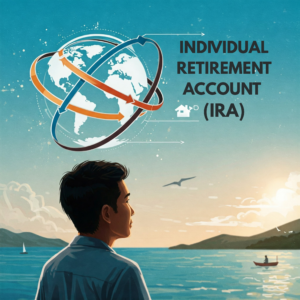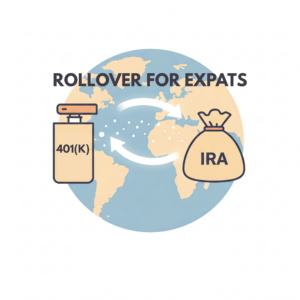Both 401(k) and IRA accounts are cornerstone retirement tools in the US.
A 401(k) rollover is a strategic financial move that can unlock better investment control, broader asset choices, and potentially improved tax outcomes.
However, US citizens living abroad must know certain 401(k) rollover to IRA rules, particularly around compliance, tax residency, and eligibility.
If you are looking to invest as an expat or high-net-worth individual, which is what I specialize in, you can email me (hello@adamfayed.com) or WhatsApp (+44-7393-450-837).
This includes if you are looking for a second opinion or alternative investments.
Some facts might change from the time of writing. Nothing written here is financial, legal, tax, or any kind of individual advice or a solicitation to invest.
For expats, the decision to roll over a 401(k) into an IRA isn’t just about investment performance.
It’s also about navigating US tax rules, avoiding unnecessary penalties, and aligning retirement planning with a cross-border lifestyle.
In the sections that follow, we’ll break down what an IRA is, how it works, and whether rolling over your 401(k) is the right move—specifically tailored to the needs of high-income earners and expatriates managing wealth internationally.

What Is an IRA and How Does It Work?

An Individual Retirement Account (IRA) is a tax-advantaged retirement savings vehicle in the US that allows individuals to invest in a wide range of assets—stocks, bonds, ETFs, and more—outside of employer-sponsored plans.
There are two main types:
- Traditional IRA – Contributions may be tax-deductible, and investment growth is tax-deferred until withdrawal. Distributions are taxed as ordinary income.
- Roth IRA – Contributions are made with after-tax income, but qualified withdrawals (including gains) are tax-free.
Annual contribution limits for IRAs are relatively modest (currently $7,000 for those under 50; $8,000 if over 50), and income thresholds apply especially for Roth IRA eligibility.
For expats, the Foreign Earned Income Exclusion (FEIE) can complicate eligibility, as excluded income doesn’t count toward IRA contribution limits.
Compared to 401(k) plans, IRAs generally offer:
- Greater flexibility in investment choices
- No requirement to remain with a former employer’s custodian
- More options for international access and estate planning
For globally mobile individuals, IRAs are particularly appealing.
They provide a structure for managing retirement assets even while living abroad, with the added benefit of choosing providers and strategies tailored to international circumstances.
Is It a Good Idea to Rollover a 401(k) to IRA?
For many expats, a 401(k) rollover to an IRA can be a smart, strategic move, but only if done with precision.
The potential benefits are significant, but so are the risks if tax rules or residency issues are misunderstood.
✔️ 401k to IRA Rollover Benefits
- Wider investment choices: IRAs open access to individual stocks, global ETFs, and alternative assets, and not just the limited fund menu typical of 401(k) plans.
- Lower fees: Employer 401(k)s often come with higher administrative costs. An IRA gives you the flexibility to choose low-cost providers.
- More control: With an IRA, you decide where your money is held, how it’s allocated, and when distributions occur. This is especially valuable when managing wealth from multiple countries.
✔️ 401k Rollover to IRA Disadvantages
- Tax complications: If not executed as a direct rollover, the IRS may treat the transfer as a taxable distribution. Timing and paperwork matter.
- Foreign residency issues: Some US brokerage firms won’t work with clients residing abroad. Expats must ensure their chosen custodian supports non-US addresses.
- Reporting burdens: Depending on your country of residence, you may face dual reporting (e.g., FATCA, FBAR, or local tax declarations), which can add compliance complexity.
✔️ When It May Be Better to Keep the 401(k)
- Your current 401(k) offers exceptional investment choices at low cost.
- You’re temporarily abroad and plan to return to the US soon.
- You haven’t yet found a US-based IRA custodian willing to work with expats.
- You’re close to retirement and already benefiting from institutional-level services.
Ultimately, a 401(k) rollover to IRA for expats can be highly beneficial, but it must be executed in a way that accounts for cross-border regulations and your long-term financial goals.

Can I Roll My 401(k) Into an IRA Without Penalty?
Yes, you can roll your 401(k) into an IRA without penalty, but only if it’s done correctly.
The IRS provides two methods, direct and indirect rollovers, and only one of them avoids immediate tax consequences by default.
✔️ Direct Rollover 401k (Recommended)
A direct rollover is when your 401(k) provider transfers funds directly to your new IRA custodian.
This method is not taxable, there’s no early withdrawal penalty, and it avoids the IRS-mandated 20% withholding that applies to indirect rollovers.
It’s also the preferred approach for expats, since it minimizes reporting complexity.
✔️ Indirect Rollover 401k (Use With Caution)
With an indirect rollover, funds are paid to you first and you’re responsible for redepositing the full amount into an IRA within 60 days.
If you miss the deadline, the IRS treats the entire sum as a taxable distribution, and if you’re under age 59½, an early withdrawal penalty of 10% may also apply.
Additionally, 20% is withheld automatically for federal taxes, meaning you’ll need to cover that amount from other sources to roll over the full balance.
401(k) to IRA Rollover for Expats Requirements
Key Steps and Documentation for 401(k) Rollover to IRA for Expats
- Request a rollover form from your 401(k) plan administrator. Specify that it is a direct rollover to avoid tax withholding.
- Open a compatible IRA account beforehand with a custodian that supports non-US residents.
- Confirm receiving institution details are correctly listed, including account number and custodian address.
- Track transfer timing to ensure funds are moved without delay or missing IRS deadlines.
- Retain all documentation for IRS and local tax authority reporting, including Form 1099-R and confirmation letters.
✔️ Choosing the Right Custodian
Not all US-based brokers and IRA custodians work with clients who live abroad.
Many freeze or restrict accounts if they detect a foreign address or IP log-in.
Look for custodians that:
- Specialize in expat accounts
- Offer global investment options
- Are familiar with cross-border compliance
- Allow digital account opening and provide strong reporting tools
✔️ Residency and Tax Reporting Requirements
Even though your retirement accounts are based in the US, expats are still subject to:
- FATCA (Foreign Account Tax Compliance Act): US citizens must report foreign financial assets on Form 8938 if thresholds are met.
- FBAR (Foreign Bank Account Report): This applies if you hold non-US accounts, but does not typically include your US IRA unless held offshore.
- Foreign tax coordination: Some jurisdictions view IRAs differently and may tax gains or distributions, depending on local law or treaties.
Meeting the requirements for a 401(k) rollover to IRA as an expat involves more than ticking boxes.
It means structuring your retirement in a way that remains compliant and tax-efficient on both sides of the world.
Partnering with the right custodian and advisor makes all the difference.

Can I Contribute to IRA as an Expat?
Yes, but only if you have US taxable earned income, and how you report foreign income plays a key role.
IRS Requirements and the FEIE
To contribute to a Traditional or Roth IRA, you must have earned income that’s taxable in the US.
If you claim the Foreign Earned Income Exclusion (FEIE) using Form 2555, you may reduce your taxable income to zero, which disqualifies you from contributing.
An alternative is using the foreign tax credit (Form 1116), which allows contributions while reducing US tax liability via foreign taxes paid.
Roth vs Traditional IRA from Abroad
- Traditional IRA: Contributions may be deductible if you meet income limits and don’t use FEIE.
- Roth IRA: No deduction, but tax-free growth. Eligibility is income-based and also affected by FEIE.
Alternatives if You’re Ineligible
- Backdoor Roth IRA: Contribute non-deductibly to a Traditional IRA, then convert.
- Spousal IRA: Your US-earning spouse can contribute for you.
Best 401(k) Rollover to IRA Options for Expats
When rolling over a 401(k) as an expat, selecting the right IRA platform is critical.
Look for US-based custodians that are expat-friendly, with the ability to service clients globally, support international wire transfers, and offer wide investment flexibility.
Key Features to Prioritize
- No restrictions on non-US logins or overseas residency
- Support for foreign addresses and FATCA compliance
- Transparent fee structures and access to global investment products
- Solid customer service with cross-border expertise
Platform Options
Some major brokerages accommodate expats under certain conditions, while others may freeze or limit accounts.
In many cases, working through a specialist advisor unlocks access to platforms designed for international clients, including those with multi-currency portfolios.
The Bottom Line
The right 401(k) rollover to IRA strategy for expats goes beyond just investment choice.
It requires aligning custody, compliance, and tax considerations with your international lifestyle.
Pained by financial indecision?

Adam is an internationally recognised author on financial matters with over 830million answer views on Quora, a widely sold book on Amazon, and a contributor on Forbes.



